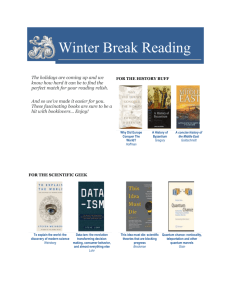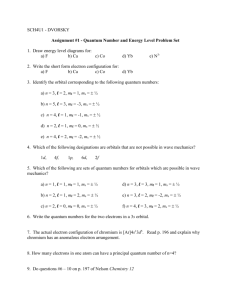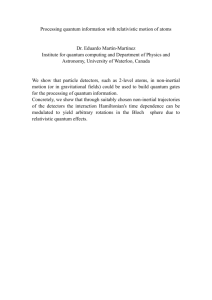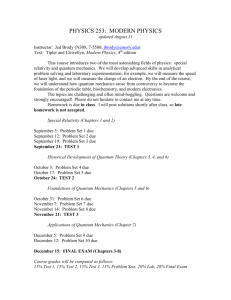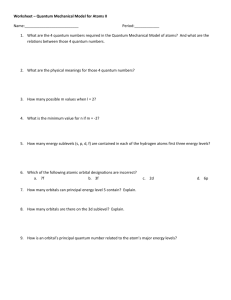Quantum physics is the most successful scientific theory in history
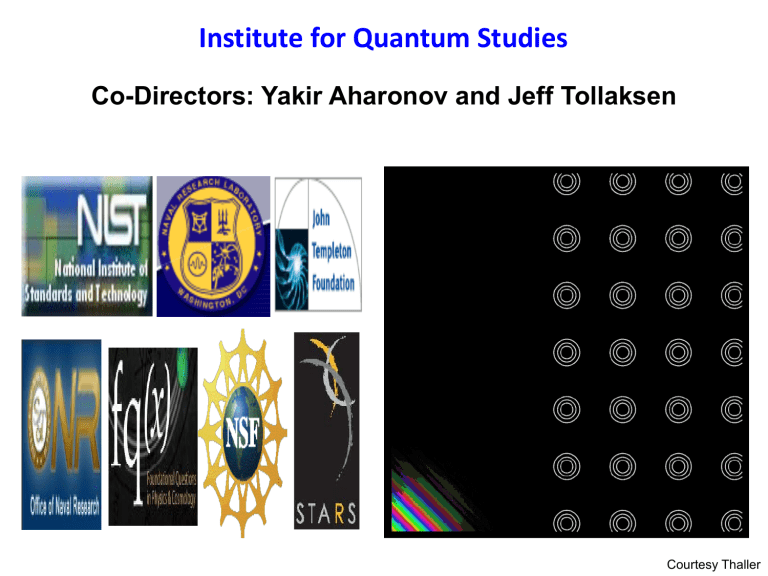
Institute for Quantum Studies
Co-Directors: Yakir Aharonov and Jeff Tollaksen
Courtesy Thaller
• Quantum physics is the most successful scientific theory in history and governs the microworld of atoms
• In the 20 th century, it led to discoveries that now make up more than one-half of the US GNP, such as computers
• There is now a revolutionary new potential: ultra-powerful computers, unbreakable codes to protect communications, etc
• NIST: “America’s future prosperity and economic security may rely in part on [quantum science] to accomplish feats in physics, information science, and mathematics that are impossible with today’s technology.”
• “Much like the way computers of today greatly improved our quality of life, quantum computers of the future will solve problems beyond our current imagination .”
2010 National Medal of Science
Obama: “…one of the most influential figures in modern physics.”
• Recently, the 100th anniversary of the most important scientific conference was celebrated.
• The organizer, David Gross was interested in the status of the questions raised at the first Solvay conference 100 years ago.
• In particular, physicists knew very well in 1911 how to use quantum theory to calculate certain physical quantities with great precision
• But, the theory was so intuitively bizarre that nobody knew what the theory meant! Incredibly, those very questions asked in 1911, remained largely open even to this day
• The next revolution concerns the “meaning” of the theory, towards many proclaim that Aharonov and group are making significant breakthroughs
The mission of the Institute for quantum studies is:
• to attract to the Center the top scientists in the world and to stimulate collaborations and synergy and
• to communicate the relevance and importance of Quantum
Studies to the broader public through a lecture series and other outreach efforts and
• to provide a focal point for institutions, state and national governments, and industry around the world for the advancement (and funding) of the foundations and applications of Quantum Mechanics
Public outreach
• Popular lecture series attracting top figures to campus
• Paul Davies
– over 20 popular books
– TV series:
The Big Questions and Cradle of Life
– winner of the 1995 Templeton
Prize, the 2001 Kelvin Medal, and the 2002 Faraday Prize
Time in quantum mechanics: 2 mysteries
Nonlocality
How can a single particle be at 2 places at the same time?
Time in quantum mechanics: 2 mysteries
Nonlocality
How can a single particle be at 2 places at the same time?
Indeterminancy
Einstein: “God does not play dice.”
Indeterminancy: playing dice
• 1 st atom decays in 1 min
• 2 nd atom (identical to 1 st atom) decays in 1 hour
• There was no difference between them in the beginning, but they behave differently later
Boundary conditions: classical vs quantum
• Classical (dependent) :
(X,P) fin
(X,P) init
.
• Quantum (independent) :
.
Physics Today, November 2010
Time-Symmetric formulation of QM (TSQM)
To be useful and interesting, any re-formulation of
QM should meet several criteria, for example:
1) TSQM is consistent with standard QM
2) TSQM brings out features in QM that were missed before (e.g. weak values)
3) TSQM lead to simplifications in calculations and stimulated discoveries in other fields
4) TSQM suggests generalizations of QM
New paradigm for amplifying signals
(AAV effect)
• Enhanced sensitivity by 10 4 ( Hosten, Kwiat, Science 2/8/08)
Courtesy Hosten, Kwiat
Newton’s laws:
local equations of motion
In classical physics, the force has to act in the same place where the particle is
“Testing Aharonov-Bohm effects”
Nonlocality: kinematic vs. dynamic
• Bell-inequality violations follow from the Hilbert-space structure of quantum mechanics; they are purely kinematic
• Aharonov-Bohm effect demonstrates dynamical non-locality , i.e. in the quantum equations of motion
Courtesy Thaller



